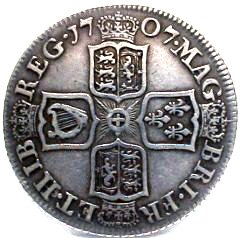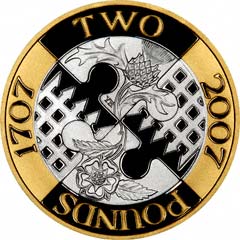| The Very Highest Quality Coins... |
| Year 2007 Coins |
|
 |
 |
The Acts of Union were two Acts of Parliament passed in 1707 (taking effect on 1 May) by the Parliament of England and the Parliament of Scotland. The acts were the implementation of the Treaty of Union negotiated between the two kingdoms. The effect of the Acts was twofold:Walter Thomas Monnington's 1925 painting called Parliamentary Union of England and Scotland 1707 hangs in the Palace of Westminster, depicting the official presentation of the law that formed the Kingdom of Great Britain.
- * to create a new state, the Kingdom of Great Britain, although the name had been used on occasion since 1603 when speaking of the Kingdoms of England and Scotland together, which had shared a monarch from that date but retained sovereign parliaments. Wales was also part of Great Britain since it had been absorbed by England by the Laws in Wales Acts 1535-1542.
- * to dissolve both parliaments and replace them with a new Parliament of Great Britain (known as the Union of the Parliaments). The new parliament was to be based in the former home of the English Parliament.
Walter Thomas Monnington's 1925 painting called Parliamentary Union of England and Scotland 1707 hangs in the Palace of Westminster, depicting the official presentation of the law that formed the Kingdom of Great Britain.
While there had been three attempts in 1606, 1667 and 1689 to unite the two countries by Acts of Parliament, these were the first Acts that had the will of both political establishments behind them, albeit for rather different reasons. In the English case, the purpose was to establish the Royal succession along Protestant lines in the same manner as provided for by the English Act of Settlement 1701, rather than that of the Scottish Act of Security. The two countries had shared a king for much of the previous century. The English were now concerned that an independent Scotland with a different king, even if he were a Protestant, might make alliances against England.
In the Scottish case, the purpose was partly to use English subsidies [citation needed] to recover from the financial problems caused by the failure of the Darién scheme and partly to remove English trade sanctions put in place through the Alien Act to force the Scottish Parliament into compliance with the Act of Settlement.
The treaty consisted of 25 articles, 15 of which were economic in character. In Scotland, each article was voted on separately and several clauses in articles were delegated to specialised subcommittees. Article 1 of the treaty was based on the political principle of an incorporating union and this was secured by a majority of 115 votes to 83 on 4 November 1706. In order to minimise the opposition of the Church of Scotland, an act was also passed to secure the Presbyterian establishment of the Church, after which the Church stopped its open opposition, although hostility remained at lower levels of the clergy. The treaty as a whole was finally ratified on 16 January 1707 by a majority of 110 votes to 67.
The ultimate securing of the treaty in the Scottish Parliament can be attributed more to the weakness and lack of cohesion between the various opposition groups in the House as opposed to the strength of pro-incorporationists [citation needed]. The combined votes of the Court party with a majority of the Squadrone Volante were sufficient to ensure the final passage of the treaty through the House. Many members had invested heavily in the Darién Scheme and they believed that they would receive compensation for their losses; Article 14, the Equivalent granted GBP398,085 10s to Scotland to offset future liability towards the English national debt. In essence, it was also used a means of compensation for investors in Darién.
Financial persuasion were also prevalent. £20,000 (£240,000 Scots) was despatched to Scotland for distribution by the Earl of Glasgow. James Douglas, 2nd Duke of Queensberry, the Queen's Commissioner in Parliament, received £12,325, the majority of the funding.
The Acts of Union were far from universally popular in Scotland, particularly amongst the general population. Many petitions were sent to the Scottish Parliament against union, and there were massive protests in Edinburgh and several other Scottish towns on the day it was passed [citation needed], as threats of widespread civil unrest resulted in the imposition of martial law by the Parliament. Sir George Lockhart of Carnwath, a Jacobite and the only member of the Scottish negotiating team who was not pro-incorporation, noted that `The whole nation appears against the Union'. Sir John Clerk of Penicuik, an ardent pro-unionist and Union negotiator, observed that the treaty was `contrary to the inclinations of at least three-fourths of the Kingdom'. Daniel Defoe's first reports were of vivid descriptions of violent demonstrations against the Union. "A Scots rabble is the worst of its kind," he later reported "for every Scot in favour there is 99 against". Public opinion against the Treaty as it passed through the Scottish Parliament was voiced through petitions from Scottish localities. Anti-union petitions were received from shires, burghs, presbyteries and parishes. The Convention of Royal Burghs also petitioned against the Union and not one petition in favour of an incorporating union was received by Parliament.
The two Acts incorporated provisions for Scotland to send representative peers from the Peerage of Scotland to sit in the House of Lords. It guaranteed that the Church of Scotland would remain the established church in Scotland, that the Court of Session would "remain in all time coming within Scotland", and that Scots law would "remain in the same force as before".
Other provisions included the restatement of the Act of Settlement 1701 and the ban on Catholics from taking the throne. It also created a customs union and monetary union. Scotland kept its independence with respect to its legal (Article 19), religious and education systems.
The Act provided that any "laws and statutes" that were "contrary to or inconsistent with the terms" of the Act would "cease and become void."
If you want to find the value of a coin you own, please take a look at our page I've Found An Old Coin, What's It Worth?
If you wish to receive further information about the year 2007 coins when available, we'd be happy to hear from you.
| ...at the Lowest Possible Price |
|
32 - 36 Harrowside, Blackpool, Lancashire, FY4 1RJ, England. Telephone (44) - (0) 1253 - 343081 ; Fax 408058; E-mail: The URL for our main page is: https://24carat.co.uk | Chard(1964) Ltd |